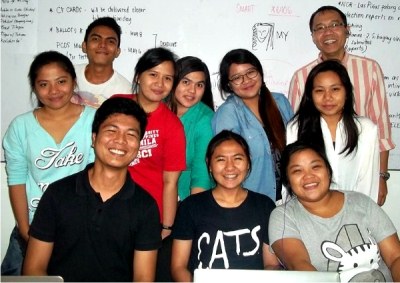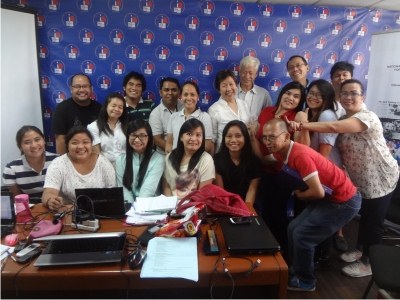| |
.. |
|
When Principles No Longer Suffice: NAMFREL and
the 2013 Elections in the Lens of an Intern
|
|
from
NAMFREL Election Monitor Vol.3, No.1 |
|
by Ruth Genevieve A. Lumibao, BS Political
Science, UP Manila |
|
|
|
(Editor's note: Ruth was one of NAMFREL's 8 interns
from UP Manila for the 2013 elections. She was joined by Via Cabatu, Kristine
Cardona, Joana Castro, Eliana Cortes, Fatima del Rosario, Karel Galang, and Roma
Monzon.) |
There is no greater volunteerism than that of protecting
democracy itself.
As Political Science students, the main objective of the
practicum was for us to see the dynamics of theory and
practice. Our usual curriculum allowed 200 hours spent in
either a government or non-government office, if not in a
far-flung area for immersion trips.
Since it was election season, the Department of Social
Sciences (DSS) of UP Manila preferred to have us spend the
full 200 hours in a nongovernment organization or in an
immersion. In
the past academic years, the students were given a hundred
hours for both government and nongovernment organizations.
The feedback we received from the upper batch, however, was
usually of warning rather than encouragement. We feared
having to succumb into clerical work, or worse, being told
to make coffee instead of reports.
|
.. |
|
 |
| Ruth (second row,
first from right), with the
other trainees and
volunteers) |
|
|
|
“You will not be used as
accessories. We will treat you as part of the staff,” Mr.
Paolo Maligaya, NAMFREL Senior Operations Associate, told us
during our orientation. We could only muster a sigh of
relief. And after that, what started as a practicum became
pure volunteerism.
In the Spirit of Volunteerism
Our first NAMFREL experience was during the NAMFREL National
Assembly in March 2013. The election season marked the
commencement of NAMFREL’s six projects: Voters’ Education
Program (VEP), Voters’ List Monitoring (VLM), Mobile
Pollwatching (MPW), Logistics Tracking (LT), Electoral
Finance (EF), and Random Manual Audit Monitoring (RMAM).
Since there were eight of us in the practicum, three were
assigned to the project teams, and the other five to the
different regional desks. I was assigned to the Mobile
Pollwatching project, which was under NAMFREL National
Council member Mr. Dammy Magbual’s supervision. Thus, I was
thrust not only in monitoring the project but also in
sending memos and making statements. Although I was not
directly in contact with NAMFREL’s chapters as much as the
regional desk officers were, I had to make sure that their
concerns were addressed adequately.
Our first day in the office marked our first meeting with
Mr. Telibert Laoc, NAMFREL National Council member, now
known to us for his favorite catch-phrase, “Your success is
our success.” He did live up to it, anyway. If anything, we
were treated as equals. Our opinions always counted, and our
suggestions always mattered. Never could we find another
organization that will treat novice election observers,
rather trainees or interns, as important as NAMFREL did.
After less than a week of being integrated in the office
environment and work, we
began our 8 a.m.-8 p.m. shift – not because it was required,
but because we, ourselves, wanted to do so.
The workload increased exponentially. We did not complain
because it was the first time that we felt what we were
doing actually mattered – how a single unanswered phone call
can discourage a chapter, how a simple encouraging memo can
ignite the spirit of our field volunteers, and how a minimal
mistake in reporting the details of an event can put
disgrace upon NAMFREL’s reputation.
In the middle of our practicum, we realized that we were
near to exceeding the required number of hours, and we were
expecting a five-day shift on election week. But the
requirement no longer applied. We continued our 8 a.m.-8
p.m. work hours, and we would even exceed until 10 p.m., up
to the point that some of the staff already offered to
transform our working area into a dormitory.
Even half-way through our practicum, we were no longer
interns. Instead, we vowed to continue working, but now as
volunteers. For all we knew, we were doing something that we
learned to love in the span of less than a month. What we
gained from it materially was not of any importance. All
good things came afterward.
. |
 |
.. |
From Principles to Dynamics
We knew the basic principle of election: voting
for people who will be vested with enormous
powers to lead the country. By virtue of the
elections, our political leaders become
accountable to the populace. As such, it
becomes the greatest foundation for good
governance. The principles were very clear;
the dynamics, however, were yet to be
identified.
We knew how the elections worked in face
value. Whatever happens beyond the surface
are mere accounts that we could read or hear
elsewhere. But to verify information and to be
in contact with NAMFREL’s local chapters
enabled us to have a clearer image of what
really happens during elections. It is to our
utmost dismay to find that the very foundation
of our democracy can no longer be relied
upon. But this does not mean that we should
lose faith in the system. Rather, it is
NAMFREL’s duty to ensure that it will be
improved. |
|
|
|
|
Vote buying, electoral violence, use of government resources, threat
and intimidation, biased media reports, private armies – we can
learn all these through the news. But what would it feel like if you
talked to someone
from Mindanao, reporting to the National Headquarters, in the middle
of a cross-fire? What would it feel like if
you talked to someone who is reporting about vote buying activities,
but reminds you to keep his/her anonymity
for safety reasons? What if you learned that field volunteers
already fear for their safety because candidates can
identify if they are members of NAMFREL?
The volunteers knew the risks that their job entailed. They knew the
sacrifices they were about to make. But as
Mr. Lester Toribio, chair of NAMFREL Manila chapter said in one of
our meetings, “Kung hindi tayo, sino?”
The election was both important and vulnerable, and it always will
be – that is why election watchdogs exist.
The 2013 Elections was the best stage to observe the interplay of
civil society, government, and COMELEC.
NAMFREL may have exposed truths about the unreliability of PCOS
machines, but it was never our intention to
defame the elections. In fact, it was our intention to make them
more transparent and reliable. We may have
exposed realities of vote buying activities in almost every part of
the Philippines, but it was never out intention to
dispense the importance of voting.
NAMFREL may have exposed many truths and realities to the point of
risking its accreditation, but never did it
waver from its mandate.
As UP students, we have always been reminded to give back to the
country. When and in what manner was up
to our discretion. NAMFREL provided us that opportunity. It was an
office, with a network of field volunteers that
we gradually learned to treat as our family.
To the local chapters who may have wondered who we were in the
beginning, we have offered you our time and
dedication, and it would be more than an honor to know if we have
done justice to your sacrifices.
To the National Headquarters, we express our gratitude for
accommodating us, for treating us as a real staff, and
for trusting us in handling the big responsibility of monitoring the
projects and communicating with the local
chapters. Although you may repeatedly tell us that we have been a
big help, I believe that the favor is still ours to
return. We owe you our experience, our knowledge, and our newfound
opportunities.
We may have sacrificed sleep, and we may have acquired deeper eye
bags for that matter. We may have had
arguments with some local chapters, and we may have faltered a
little. We may have been drained of energy
and we may have struggled. But we have stood our ground. All this,
motivated by a simple question:
“Kung hindi tayo, sino?”
Now, 2016 awaits. |
|
|
| |
.
.
. |
|
| |
| |
|
|

